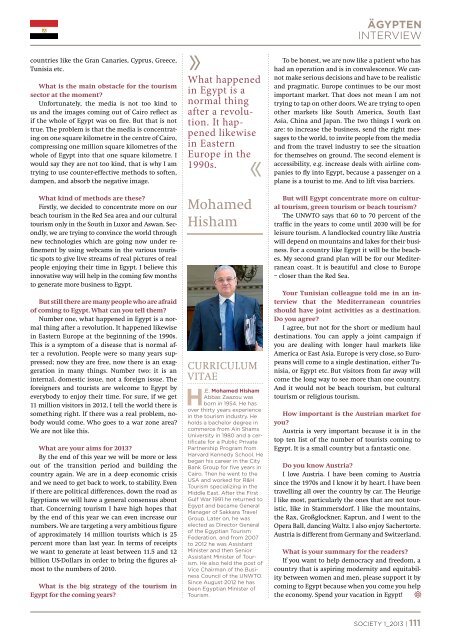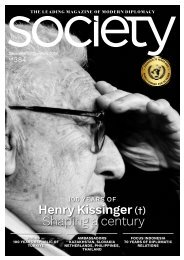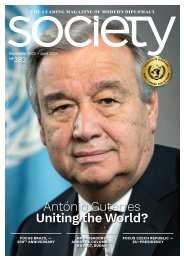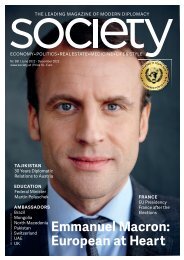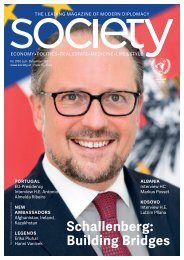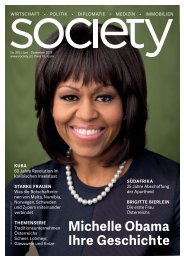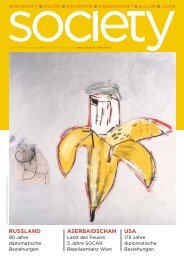Society 363 / 2013
Sie wollen auch ein ePaper? Erhöhen Sie die Reichweite Ihrer Titel.
YUMPU macht aus Druck-PDFs automatisch weboptimierte ePaper, die Google liebt.
ägypten<br />
Interview<br />
countries like the Gran Canaries, Cyprus, Greece,<br />
Tunisia etc.<br />
What is the main obstacle for the tourism<br />
sector at the moment?<br />
Unfortunately, the media is not too kind to<br />
us and the images coming out of Cairo reflect as<br />
if the whole of Egypt was on fire. But that is not<br />
true. The problem is that the media is concentrating<br />
on one square kilometre in the centre of Cairo,<br />
compressing one million square kilometres of the<br />
whole of Egypt into that one square kilometre. I<br />
would say they are not too kind, that is why I am<br />
trying to use counter-effective methods to soften,<br />
dampen, and absorb the negative image.<br />
What kind of methods are these?<br />
Firstly, we decided to concentrate more on our<br />
beach tourism in the Red Sea area and our cultural<br />
tourism only in the South in Luxor and Aswan. Secondly,<br />
we are trying to convince the world through<br />
new technologies which are going now under refinement<br />
by using webcams in the various touristic<br />
spots to give live streams of real pictures of real<br />
people enjoying their time in Egypt. I believe this<br />
innovative way will help in the coming few months<br />
to generate more business to Egypt.<br />
But still there are many people who are afraid<br />
of coming to Egypt. What can you tell them?<br />
Number one, what happened in Egypt is a normal<br />
thing after a revolution. It happened likewise<br />
in Eastern Europe at the beginning of the 1990s.<br />
This is a symptom of a disease that is normal after<br />
a revolution. People were so many years suppressed;<br />
now they are free, now there is an exaggeration<br />
in many things. Number two: it is an<br />
internal, domestic issue, not a foreign issue. The<br />
foreigners and tourists are welcome to Egypt by<br />
everybody to enjoy their time. For sure, if we get<br />
11 million visitors in 2012, I tell the world there is<br />
something right. If there was a real problem, nobody<br />
would come. Who goes to a war zone area?<br />
We are not like this.<br />
What are your aims for <strong>2013</strong>?<br />
By the end of this year we will be more or less<br />
out of the transition period and building the<br />
country again. We are in a deep economic crisis<br />
and we need to get back to work, to stability. Even<br />
if there are political differences, down the road as<br />
Egyptians we will have a general consensus about<br />
that. Concerning tourism I have high hopes that<br />
by the end of this year we can even increase our<br />
numbers. We are targeting a very ambitious figure<br />
of approximately 14 million tourists which is 25<br />
percent more than last year. In terms of receipts<br />
we want to generate at least between 11.5 and 12<br />
billion US-Dollars in order to bring the figures almost<br />
to the numbers of 2010.<br />
What is the big strategy of the tourism in<br />
Egypt for the coming years?<br />
»What happened<br />
in Egypt is a<br />
normal thing<br />
after a revolution.<br />
It happened<br />
likewise<br />
in Eastern<br />
Europe in the<br />
1990s.<br />
«<br />
Mohamed<br />
Hisham<br />
curriculum<br />
vitae<br />
H<br />
.E. Mohamed Hisham<br />
Abbas Zaazou was<br />
born in 1954. He has<br />
over thirty years experience<br />
in the tourism industry. He<br />
holds a bachelor degree in<br />
commerce from Ain Shams<br />
University in 1980 and a certificate<br />
for a Public Private<br />
Partnership Program from<br />
Harvard Kennedy School. He<br />
began his career in the City<br />
Bank Group for five years in<br />
Cairo. Then he went to the<br />
USA and worked for R&H<br />
Tourism specializing in the<br />
Middle East. After the First<br />
Gulf War 1991 he returned to<br />
Egypt and became General<br />
Manager of Sakkara Travel<br />
Group. Later on, he was<br />
elected as Director General<br />
of the Egyptian Tourism<br />
Federation, and from 2007<br />
to 2012 he was Assistant<br />
Minister and then Senior<br />
Assistant Minister of Tourism.<br />
He also held the post of<br />
Vice Chairman of the Business<br />
Council of the UNWTO.<br />
Since August 2012 he has<br />
been Egyptian Minister of<br />
Tourism.<br />
To be honest, we are now like a patient who has<br />
had an operation and is in convalescence. We cannot<br />
make serious decisions and have to be realistic<br />
and pragmatic. Europe continues to be our most<br />
important market. That does not mean I am not<br />
trying to tap on other doors. We are trying to open<br />
other markets like South America, South East<br />
Asia, China and Japan. The two things I work on<br />
are: to increase the business, send the right messages<br />
to the world, to invite people from the media<br />
and from the travel industry to see the situation<br />
for themselves on ground. The second element is<br />
accessibility, e.g. increase deals with airline companies<br />
to fly into Egypt, because a passenger on a<br />
plane is a tourist to me. And to lift visa barriers.<br />
But will Egypt concentrate more on cultural<br />
tourism, green tourism or beach tourism?<br />
The UNWTO says that 60 to 70 percent of the<br />
traffic in the years to come until 2030 will be for<br />
leisure tourism. A landlocked country like Austria<br />
will depend on mountains and lakes for their business.<br />
For a country like Egypt it will be the beaches.<br />
My second grand plan will be for our Mediterranean<br />
coast. It is beautiful and close to Europe<br />
– closer than the Red Sea.<br />
Your Tunisian colleague told me in an interview<br />
that the Mediterranean countries<br />
should have joint activities as a destination.<br />
Do you agree?<br />
I agree, but not for the short or medium haul<br />
destinations. You can apply a joint campaign if<br />
you are dealing with longer haul markets like<br />
America or East Asia. Europe is very close, so Europeans<br />
will come to a single destination, either Tunisia,<br />
or Egypt etc. But visitors from far away will<br />
come the long way to see more than one country.<br />
And it would not be beach tourism, but cultural<br />
tourism or religious tourism.<br />
How important is the Austrian market for<br />
you?<br />
Austria is very important because it is in the<br />
top ten list of the number of tourists coming to<br />
Egypt. It is a small country but a fantastic one.<br />
Do you know Austria?<br />
I love Austria. I have been coming to Austria<br />
since the 1970s and I know it by heart. I have been<br />
travelling all over the country by car. The Heurige<br />
I like most, particularly the ones that are not touristic,<br />
like in Stammersdorf. I like the mountains,<br />
the Rax, Großglockner, Kaprun, and I went to the<br />
Opera Ball, dancing Waltz. I also enjoy Sachertorte.<br />
Austria is different from Germany and Switzerland.<br />
What is your summary for the readers?<br />
If you want to help democracy and freedom, a<br />
country that is aspiring modernity and equitability<br />
between women and men, please support it by<br />
coming to Egypt because when you come you help<br />
the economy. Spend your vacation in Egypt! •<br />
<strong>Society</strong> 1_<strong>2013</strong> | 111


